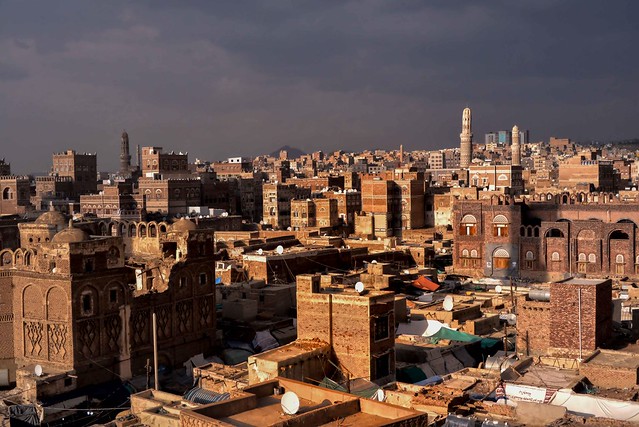News
Security officials: Yemeni separatists control city of Aden

Yemeni separatists have wrested control of the port city of Aden (File Photo: Rod Waddington/Flickr, CC BY-SA 2.0)
SANAA, Yemen — Yemeni separatists have wrested control of the port city of Aden — and the grounds of the presidential palace — from forces loyal to the internationally backed government, security officials said Saturday.
The separatists backed by the United Arab Emirates had been fighting as part of the Saudi-led coalition that supports the government but turned against those forces in clashes in the southern city. The death toll in four days of fighting climbed to more than 70 people, including civilians, officials said.
The latest development could further fracture the coalition that has battled Iran-aligned Houthi rebels since 2015 on behalf of President Abed Rabbo Mansour Hadi’s government, which is largely confined to Aden. Houthis control the north and the capital, Sanaa
Col. Turki al-Maliki, a spokesman for the Saudi-led coalition, was quoted Saturday in the state-run Saudi Press Agency as saying that “the coalition’s joint leadership is calling for an immediate cease-fire in Yemen’s interim capital of Aden … and will use military force against those who violate that.”
He said the coalition called on the separatist Southern Transitional Council and its Security Belt paramilitary forces to “return immediately to its positions and withdraw from all positions they seized in the past days.”
Security officials in Aden, who spoke on the condition of anonymity because they weren’t authorized to brief the media, said Saudi troops have been guarding the offices of Hadi and his ministers in the presidential palace, but Security Belt forces are outside the building. They said about 300 presidential palace guards were allowed to leave the area, and Interior Minister Ahmed al-Maisari and top military officials were evacuated to Saudi Arabia on Saturday.
Separatists also captured a military camp in the central Khormaksar neighbourhood, they said.
Saudi Arabia has invited the warring sides in Aden for an “emergency meeting” in Saudi Arabia, according to the Saudi news agency.
The separatists later said in a brief statement they accepted the cease-fire and the meeting invitation.
The fighting erupted Wednesday when forces loyal to the Southern Transitional Council attempted to break into the presidential palace in Aden after former Cabinet minister Hani Bin Braik, the deputy head of the STC, called for Hadi’s government to be toppled.
Braik accused Hadi and his forces of being members of, or loyal to, the Yemeni branch of the Muslim Brotherhood, a pan-Arab political movement that the UAE and some other Arab countries view as a terrorist organization.
The internationally recognized government, in turn, has accused the separatist leader of fomenting sedition that would only serve the Houthis and called upon the Saudi and Emirati governments to press the separatists to halt their attacks.
Deputy Foreign Minister Mohammed Abdullah al-Hadrami blamed the Southern Transitional Council and the UAE for the “coup consequences” in Aden. He called for Abu Dhabi to “immediately halt its financial and military support for those rebel groups,” according to series of posts on the ministry’s Facebook page.
Aden is the seat of power for Hadi, who has been staying in Saudi Arabia since the Houthis took over Sanaa in 2014, ushering in the civil war. The Saudi-led coalition entered the war in March 2015 on behalf of his government.
The STC is led by Aidarous al-Zubaidi, a former Aden official. Hadi’s government sees its formation as a move that “targets the county’s interests, its future and social fabric.”
There have long been tensions within the coalition between northerners who fled to the south during the Houthis’ 2014 advance and southerners who once had their own state and want greater autonomy or outright independence.
In January 2018, the southern separatists attempted to seize government facilities and military bases in Aden. But peace in the interim capital was restored after a few weeks.
The UAE is a key member of the coalition. But its relations with Hadi have been tense amid allegations the Emiratis have offered patronage to southern Yemeni politicians campaigning for secession as well as what the president perceives as UAE violations of his country’s sovereignty.
The stalemated war has claimed tens of thousands of lives, thrust millions to the brink of famine and spawned the world’s most devastating humanitarian crisis.
UAE’s official WAM news agency reported Saturday that the country’s foreign minister, Sheikh Abdullah bin Zayed, called for an end to the military escalation in Aden.
On Saturday, government officials said at least 45 people, both combatants and civilians, died in clashes at the Fourth Brigade camp. Another five civilians were killed in the surrounding Dar Saad neighbourhood, according to health officials.
That has raised the death toll this week to 70, and dozens of others have been wounded. Many residents have also been trapped in their homes as fighting has moved into densely populated areas.
“We cannot find safe roads to flee the clashes. There is no way to get out. People are frightened as heavy fighting comes close to them,” a resident in Dar Saad said on condition of anonymity for fear of reprisal.





















